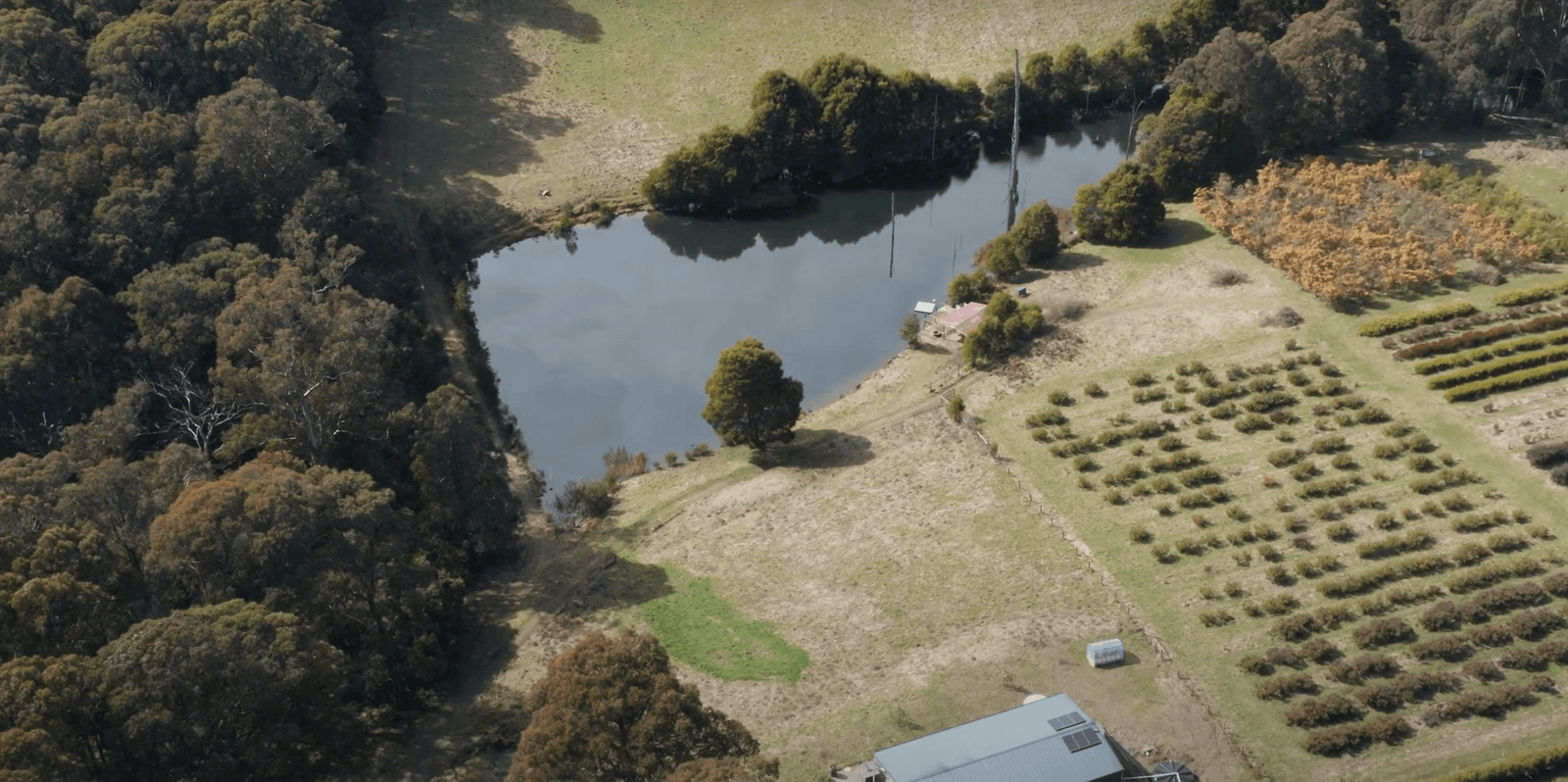Ecosystem Restoration & Producing Australia’s First Carbon Neutral Whisky
Sustainably made whisky goes hand in hand with climate action at this distillery on Wurundjeri Country in Kinglake, Victoria.
Motivated to produce sustainable whisky that couldn’t be made anywhere else, Chantal Daniels and Sam Lowe of Kinglake Distillery are taking practical action on climate at their property by working with Greenfleet to revegetate a third of their land. Through this revegetation project, carbon will be removed from the atmosphere and habitat extended for the region’s native wildlife, including the Greater Glider.
It is also enhancing the family’s experience on the property in their endeavour to take tangible and practical climate action while running their business.
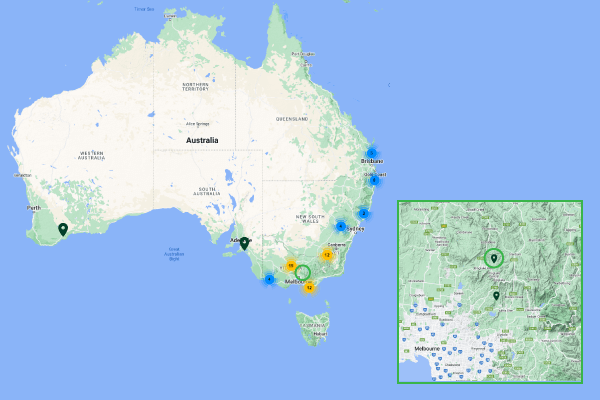
Location
Located about 1.5 hours northeast of Melbourne, Kinglake Distillery is situated on about 18 hectares in Kinglake Central. A third of this land is being restored to native forest through Greenfleet’s revegetation work.
You can see where all of Greenfleet’s revegetation projects are underway here.
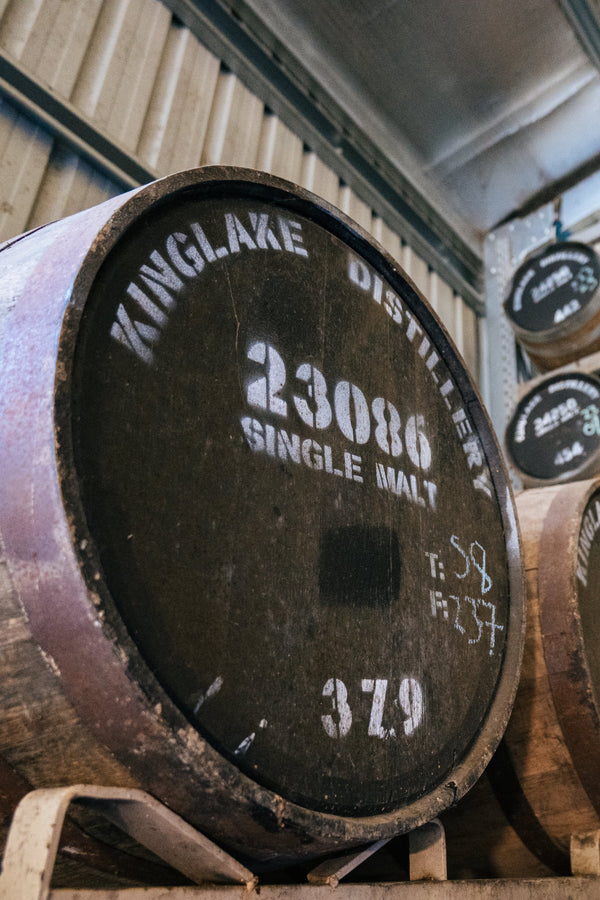
Creating Sustainable Whisky & A Sustainable Business
Chantal and Sam have always been clear on their goal – to produce a handmade whisky that captures the character of the Kinglake region, with minimal impact on its natural resources.
Now, they run Australia’s first carbon-neutral, off-grid whisky distillery but the journey to becoming certified carbon neutral has not been easy. With the revegetation project now underway, the rewards for investing in the environment will grow all around them.
Since launching Kinglake Distillery in 2018, Chantal and Sam have prioritised sustainability in all aspects of running their business. “We’re passionate believers in doing our best for the environment,” explains Sam, “the idea of leaving the world a little bit better than how you found it really resonates with us”.
In the early stages of establishing the distillery the couple worked with environmental consultants Pangolin Associates to identify actions that would improve efficiencies and reduce the business’ carbon emissions.
The rural Kinglake property has its own natural spring to provide clean, chilled, unfiltered water for whisky production. Sustainable solutions were readily adopted for addressing waste, such as using leftover liquid as fertiliser and diverting spent grain from landfill to farmers for livestock feed.
Reflecting on the whisky making process, Sam notes that “the heating and cooling processes are massively energy intense, but we wanted to be at the cutting edge of sustainability, not a laggard”.
The couple were undeterred by the challenge of making Kinglake Distillery an environmentally positive business, doing what they could to reduce their carbon emissions and investing in carbon credit projects that remove emissions from the atmosphere.
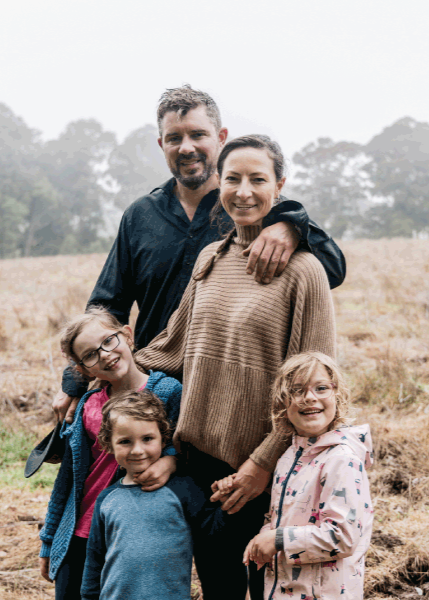
History Of The Property
Kinglake is a small, quiet township on the ridge line of the Great Dividing Range. It is flanked by farmlands and the Kinglake National Park. The park’s 23,210 hectares of rugged, dense bushland have been protected since 1928 and are home to almost 600 native plant species, 40 native mammals and 90 native bird species.
Chantal’s family has lived and worked in Kinglake for generations. Her parents grow native flowers on a farm in Kinglake, and Chantal grew up with an appreciation of the natural environment.
In the 1900s the land on which Kinglake Distillery sits was owned by Ellen O’Grady, a woman passionate about preserving the land and vegetation despite the societal desire for gold at the time. According to Chantal, in 1906, Ellen was dragged kicking and screaming from parliament, protesting that Kinglake should not be hollowed out in the quest for gold. Chantal and Sam pay homage to Ellen’s legacy through their conservation efforts, the sustainable running of their business, and their ‘O’Grady’s Stand’ whisky release.
The property came up for sale following the 2009 bushfires that devastated the Kinglake region. At the time, Chantal had been travelling and working in Europe, where she met Sam. The couple decided to purchase the property, with dreams of building a family business of their own. With a shared passion for spirits, Sam and Chantal embarked on an ambitious journey of building Australia’s first carbon-neutral, off-grid whisky distillery.
Sam, Chantal, and their family planting trees at their property as part of the 2022 revegetation project.
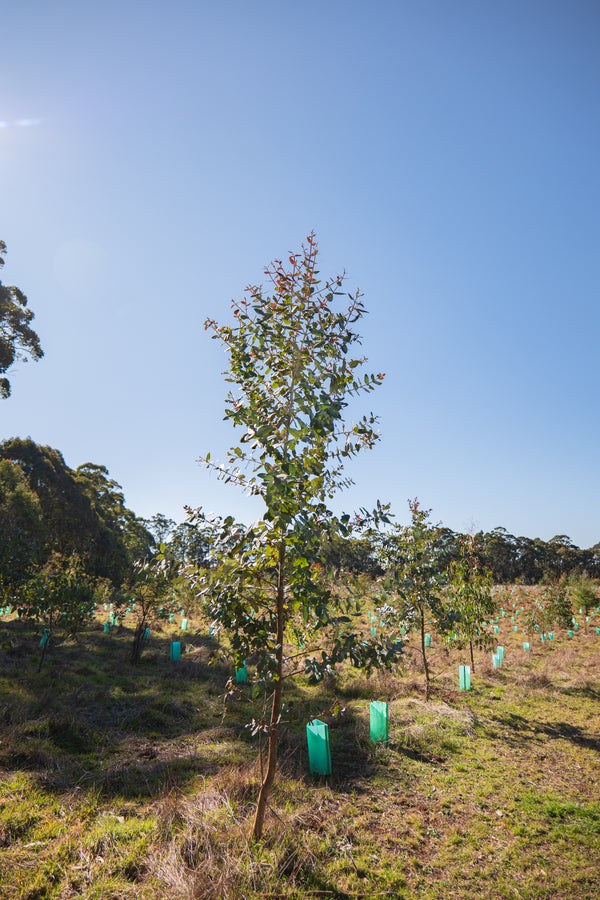
Restoring A Native Forest With Greenfleet
Chantal and Sam reached out to Greenfleet in 2021 to discuss whether their property could be revegetated. Adjacent to Kinglake National Park, the location of the property made it highly valuable not only for sequestering carbon, but for increasing habitat for endangered and vulnerable flora and fauna.
Sam notes that he and Chantal “were committed to the property being used as a distillery indefinitely and to improving the landscape” but notes that revegetating their land raised eyebrows within the local farming community.
Reflecting on the ecological impact being made through this project, Greenfleet’s General Manager of Revegetation, Alex Paddock says “the Kinglake area in general is considered to have high biodiversity values and we jumped at the opportunity to partner with Sam and Chantal to revegetate their property and increase vital biodiverse habitat in the region”.
The Greenfleet revegetation project at Kinglake Distillery aims to restore and protect native ecosystems. The forest planted is projected to sequester approximately 15,000 tonnes of carbon over its lifetime.
After many months of discussion with Greenfleet and weeks of preparing the ground, it was incredibly gratifying for Sam and Chantal to see the planting taking place.
“Carbon offsetting can sometimes be part of an administrative exercise in achieving carbon neutral status. But we wanted to make a tangible impact. Having the Greenfleet project on the property is a highly visible example of taking climate action.” Reflects Sam. “There’s no downside. It’s positive for the environment and has enhanced the experience of living on the property”.

Community Effort
Over several days in May 2022 Greenfleet’s Revegetation Team and corporate supporters planted over 8,600 native trees and plants from 21 different species indigenous to the area.
Many of the seedlings planted were sourced from Nangak Tamboree Wildlife Sanctuary, located at La Trobe University. La Trobe University has been taking climate action with Greenfleet for over 20 years.
Greenfleet supporters came from across Victoria to help plant the forest that is now growing at the distillery. We’d like to thank the following organisations who joined us to take climate action on the day:
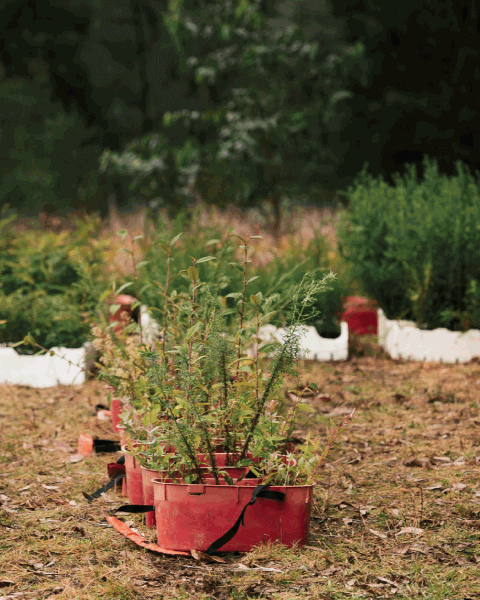
Selecting Biodiverse Species
Greenfleet’s Revegetation Team carefully selected native trees and plant species that belong to the ecological vegetation classes of Damp Forest and Shrubby Foothill Forest that are present in the region. By selecting species to make up the canopy, midstory, and ground cover, we are growing a resilient and biodiverse forest that replicates the vegetation present prior to land clearing.
Over the next century the site will grow to include a tall overstory dominated by tall eucalypt species including messmate stringybark (Eucalyptus obliqua) and mountain grey gum (Eucalyptus cypellocarpa). Planting eucalypts in this region is of particular importance for Greater Gliders, which were sadly listed as Endangered in 2022.
Greater Gliders feed mainly on the leaves of these trees and natural hollows will be used for nesting and shelter as the trees age. Key midstory and understorey species planted on the site include blackwood (Acacia melanoxylon), hazel pomaderris (Pomaderris aspera), and golden-tip (Goodia lotifolia).
Native seedlings awaiting planting at Kinglake Distillery in May 2022.
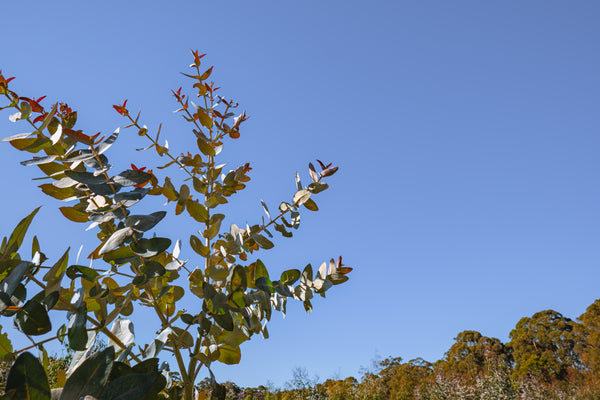
Restoring Critically Endangered Plant Species
Many key species were planted for the midstory and understorey of the forest.
Understorey plantings included Round-leaf Pomaderris (Pomaderris vacciniifolia), a critically endangered endemic species to the Damp Forest and Shrubby Foothill Forests of north-east Melbourne.
About 50 of these trees were scattered throughout the planting and onsite assessments since have shown these important trees growing well as a part of the establishing forest.
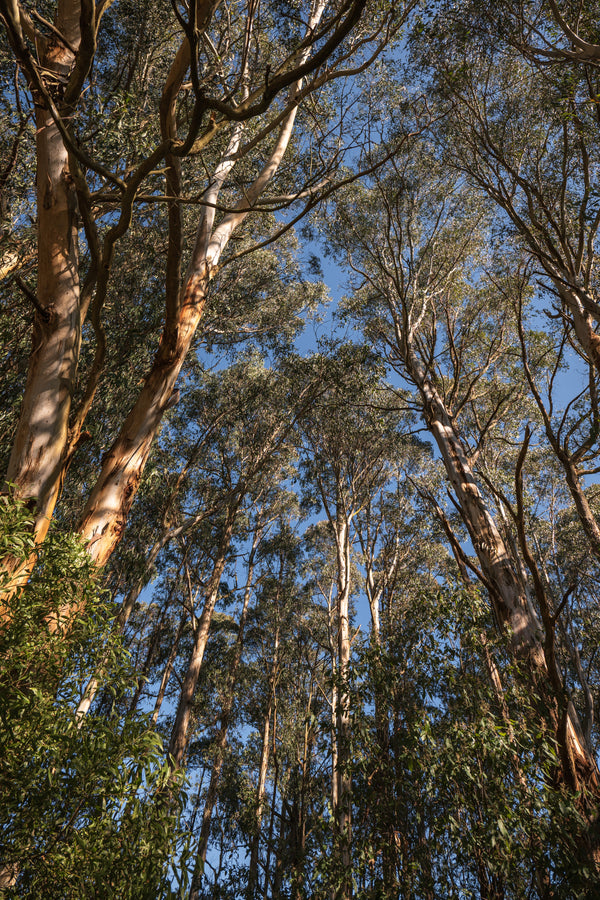
Extending Habitat For Kinglake’s Wildlife
The site’s revegetation will increase the habitat available to a variety of native fauna including some rare and endangered species.
Some species already found in the area include the Swamp Wallaby, Sugar Glider, Common Wombat, Short-beaked Echidna, Powerful Owl, Southern Boobook and Superb Lyrebird.
The proximity of this project to Kinglake National Park means it will also help provide a habitat steppingstone to this existing vegetation. A population of 400 koalas were translocated to the park from French Island following the devastating losses of Black Saturday in 2009 and revegetating this region remains vital following those events.
In fact, the project at Kinglake Distillery builds on Greenfleet’s previous revegetation work in the region. Following Black Saturday, Greenfleet also restored parts of the Watson’s Creek Biolink that had been heavily impacted by the fires. Nearly 30 hectares were restored there between 2010 and 2011.
Protected for 100 years, the native habitat restoration at Kinglake Distillery will benefit vulnerable animals like the koala, brush-tailed phascogale and yellow-bellied glider, and potentially the endangered spotted tailed quoll.
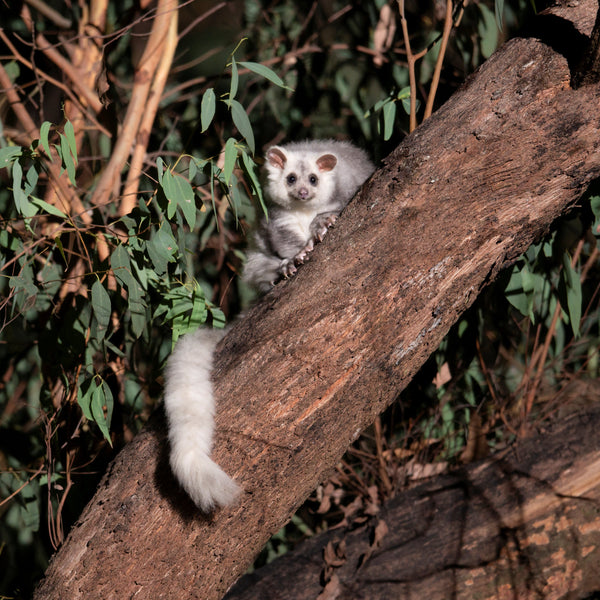
Restoring Greater Glider Habitat In Kinglake
The conservation status of the Greater Glider, which once occurred throughout the mountain forests and foothills of the east coast of Australia, has recently been reclassified from vulnerable to endangered.
Greater Gliders are dependent on large hollow bearing trees for shelter and nesting and are mostly found in old growth forests where these established trees occur. Native forest logging, habitat clearing, bushfires and climate change are contributing to the decline of this unique species.
Urgent action is required if we are to save animals like the Greater Glider from extinction, starting with preserving and revegetating key habitat and restoring native ecosystems. Greenfleet’s revegetation in this area is an important step in ensuring these animals can survive and thrive for generations to come.
Photo credit: Greater glider, photographed by Justin Cally
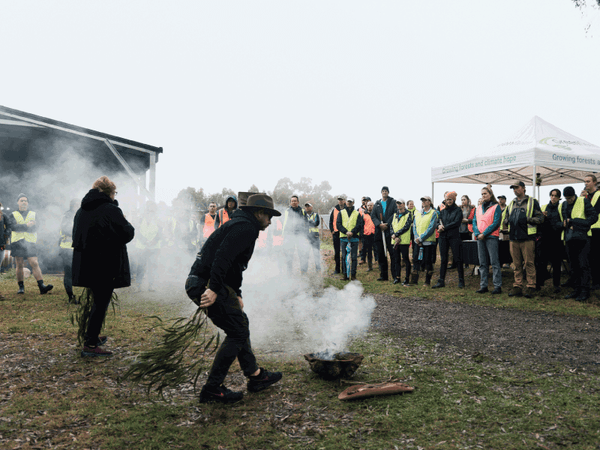
Traditional Owners Of Kinglake
For thousands of years the Kinglake Ranges were inhabited by the Taungurung people in the north, and the Wurundjeri people in the south.
Both Aboriginal clan groups belong to the Kulin Nation, sharing land borders but also kinship ties, related languages, trading agreements and creation stories. The dense forests and freshwater creeks of this mountainous landscape provided an abundance of plants and animals that sustained the Indigenous populations.
Present day Wurundjeri people continue to have a strong connection with the area now known as Kinglake. In May 2022, Wurundjeri Elder Aunty Joy Wandin Murphy and her son Craig Welcomed Greenfleet supporters onto the land to begin work on the revegetation project on the grounds of Kinglake Distillery.
Aunty Joy Murphy Wandin Welcoming Greenfleet to Country with help from her son, Craig.
Protecting The Forest For 100 Years
The forest growing at Kinglake is legally protected for 100 years. This is a pivotal part in Greenfleet’s revegetation process as it ensures that the climate action we deliver is sustainable and long term.
By ensuring the legal protection of our revegetation projects, we know that forests can grow to remove the optimum amount of carbon while delivering a wealth of other environmental benefits including established wildlife habitat and improvements to soil and waterways.
Find out more about how and why we protect our forests for 100 years here.
About Greenfleet
Greenfleet is an environmental not-for-profit organisation protecting our climate by restoring our forests. For over 25 years, Greenfleet has been restoring native forests in Australia and New Zealand to fight the impacts of climate change and restore habitat for some of our most vulnerable wildlife.
Since 1997, Greenfleet has planted over 11.2 million trees across 550+ forests that are legally protected for up to 100 years. Throughout their lifetime, these forests will remove more than 4.9 million tonnes of CO2-e from the atmosphere.
Greenfleet is fully funded by individual and corporate supporters who offset their carbon emissions or support native habitat restoration. You can find out more about becoming a Greenfleet supporter and enabling projects like this one here.
Greenfleet’s revegetation and biodiversity projects, such as the one at Kinglake Distillery, are a tangible step in restoring and protecting the natural environment while taking action to secure a safe climate.
For Chantal and Sam and their young family, the benefits of investing in the environment are visible every day on their property at Kinglake. As a native forest grows around them, they are improving the biodiversity of the area and providing key habitat for threatened species.
Greenfleet has been delivering effective climate action for over 25 years and people like Chantal and Sam are part of a collective of individuals and organisations that are committed to growing hope for our planet.
Find out more about Greenfleet’s revegetation projects: www.greenfleet.com.au And learn more about Chantal and Sam’s work at Kinglake Distillery: www.kinglakedistillery.com.au
All photos included in this piece were taken by Jacinta Keefe.
Location Size
6 hectares in Kinglake, north-east of Melbourne.
Planting Dates
2022
Species
- Black wattle (Acacia dealbata)
- Green wattle (Acacia mearnsii)
- Prickly moses (Acacia verticillata)
- Wiry buttons (Amperea xiphoclada)
- Creek cassinia (Cassinia arcuata)
- Mirror bush (Coprosma repens)
- Native fuchsia (Correa reflexa)
- Showy parrot-pea (Dillwynia hylicoides)
- Silver gum (Eucalyptus crenulata)
- Yellow box (Eucalyptus melliodora)
- River red gum (Eucalyptus amaldulensis)
- Victorian blue gum (Eucalyptus globulus ubsp. pseudoglobulus)
- Messmate stringybark (Eucalyptus bliqua)
- Manna gum (Eucalyptus viminalis)
- Cider gum (Eucalyptus gunnii)
- White goodenia (Goodenia albiflora)
- Golden tip (Goodia lotifolia)
- Burgan (Kunzea ericoides)
- Holly lomatia (Lomatia ilicifolia)
- Silver daisy-bush (Olearia argyrophylla)
- Snowy daisy-bush (Olearia lirata)
- Common pomaderris (Pomaderris aspera)
- Hazel pomaderris (Pomaderris aspera var. helianthemifolia)
- Victorian Christmas bush (Prostanthera lasianthos)
- Bush-peas (Pultenaea sp.)
- Kangaroo apple (Solanum aviculare)
- Dusty Miller (Spyridium parvifolium)
- Pink bells (Tetratheca ciliata)



